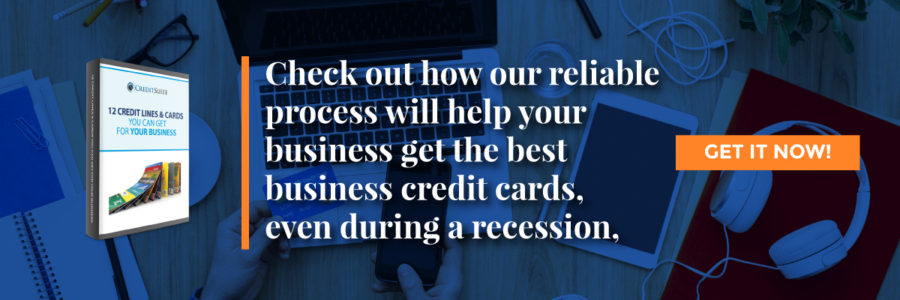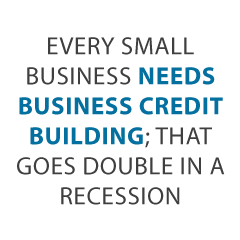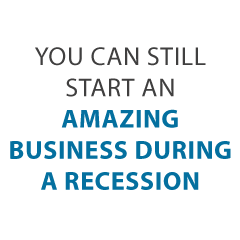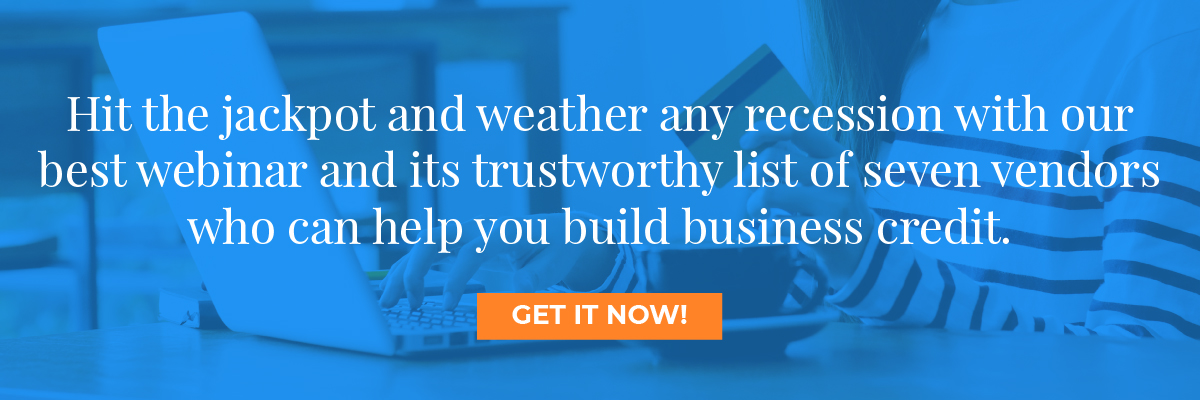
The Recession-Proof Best Business Credit Cards with no Annual Fee
Can you get the recession-proof best business credit cards with no annual fee? Absolutely! No matter what the economy is doing, you can get cards just like these.
You Need the Recession-Proof Best Business Credit Cards with No Annual Fee
Are you looking for the recession-proof best business credit cards with no annual fee?
According to the SBA, business credit card limits are 10 – 100 times those of personal cards! This means you can get a lot more cash with company credit.
And this also means you can have personal credit cards at shops, and now have an alternate card at the same retail stores for your company. And you will not have to put up collateral, cash flow, or financial information to get small business credit.
The Recession-Proof Best Business Credit Cards with No Annual Fee – Benefits
Features vary, so be sure to select the benefit you prefer from this array of alternatives.
The Recession-Proof Best Business Credit Cards with No Annual Fee
No Yearly Fee/Flat Rate Cash Back
Ink Business Unlimited℠ Credit Card
Check out the Ink Business Unlimited℠ Credit Card. Beyond no annual fee, get an introductory 0% APR for the initial one year. Afterwards, the APR is a variable 14.74 – 20.74%.
You can get unlimited 1.5% Cash Back rewards on every purchase made for your corporation. And get $500 bonus cash back after spending $3,000 in the initial three months from account opening. You can redeem your rewards for cash back, gift cards, travel and more using Chase Ultimate Rewards®. You will need excellent credit scores to get this card.
Find it here: https://creditcards.chase.com/business-credit-cards/ink/unlimited
Establish business credit fast and beat the recession with our research-backed guide to 12 business credit cards and lines.
Irresistible Cards for Jackpot Rewards That Never Expire
Capital One® Spark® Cash Select for Business
Have a look at the Capital One® Spark® Cash Select for Business. It has no yearly fee. You can get 1.5% cash back on every purchase. There is no limit on the cash back you can earn. Also get a one-time $200 cash bonus once you spend $3,000 on purchases in the first 3 months. Rewards never expire.
Pay a 0% introductory APR for 9 months. Then pay 14.49% – 22.49% variable APR afterwards.
You will need good to excellent credit scores to qualify.
Find it here: https://www.capitalone.com/small-business/credit-cards/spark-cash-select/
An Alternative to the Recession-Proof Best Business Credit Cards with No Annual Fee: Dependable Credit Cards for Fair to Poor Credit, Not Calling for a Personal Guarantee
Brex Card for Startups
Check out the Brex Card for Startups. It has no yearly fee.
You will not need to provide your Social Security number to apply. And you will not need to provide a personal guarantee. They will take your EIN.
Nonetheless, they do not accept every industry.
Additionally, there are some industries they will not work with, as well as others where they want added documentation. For a list, go here: https://brex.com/legal/prohibited_activities/.
To determine creditworthiness, Brex checks a corporation’s cash balance, spending patterns, and investors.
You can get 7x points on rideshare. Get 4x on Brex Travel. Also, get triple points on restaurants. And get double points on recurring software payments. Get 1x points on everything else.
You can have bad credit scores (even a 300 FICO) to qualify.
Find it here: https://brex.com/lp/startups-higher-limits/
Establish business credit fast and beat the recession with our research-backed guide to 12 business credit cards and lines.
Terrific Cards for Cash Back
Flat-Rate Rewards
Capital One ® Spark® Cash for Business
Check out the Capital One® Spark® Cash for Business. It has an introductory $0 yearly fee for the first year. Afterwards, this card costs $95 each year. There is no introductory APR offer. The regular APR is a variable 18.49%.
You can get a $500 one-time cash bonus after spending $4,000 in the first 3 months from account opening. Get unlimited 2% cash back. Redeem at any time without minimums.
You will need great to outstanding credit to qualify.
Find it here: https://www.capitalone.com/small-business/credit-cards/spark-cash/
Flat-Rate Rewards and No Yearly Fee
Discover it® Business Card
Take a look at the Discover it® Business Card. It has no annual fee. There is an introductory APR of 0% on purchases for 12 months. After that the regular APR is a variable 14.49 – 22.49%.
Get unlimited 1.5% cash back on all purchases, with no category restrictions or bonuses. They double the 1.5% Cashback Match™ at the end of the first year. There is no minimum spend requirement.
You can download transactions| quickly to Quicken, QuickBooks, and Excel. Keep in mind: you will need great to exceptional credit scores to get approval for this card.
https://www.discover.com/credit-cards/business/
Bonus Categories
Ink Business Cash℠ Credit Card
Check out the Ink Business Cash℠ Credit Card. It has no annual fee. There is a 0% introductory APR for the first year. Afterwards, the APR is a variable 14.74 – 20.74%. You can get a $500 one-time cash bonus after spending $3,000 in the first 3 months from account opening.
You can earn 5% cash back on the initial $25,000 spent in combined purchases at office supply stores and on web, cable, and phone services each account anniversary year.
Get 2% cash back on the initial $25,000 spent in combined purchases at filling stations and restaurants each account anniversary year. Earn 1% cash back on all other purchases. There is no restriction to the amount you can get.
You will need outstanding credit to get this card.
Find it here: https://creditcards.chase.com/business-credit-cards/ink/cash?iCELL=61GF
Boosted Cash Back Categories
Bank of America® Business Advantage Cash Rewards MasterCard® credit card
Take a look at the Bank of America® Business Advantage Cash Rewards MasterCard® credit card. Get an 0% introductory APR for the initial 9 billing cycles of the account. Afterwards, the APR is 13.74% – 23.74% variable. There is no yearly fee. You can get a $300 statement credit offer.
Get 3% cash back in the category of your choice. So these are gas stations (default), office supp ly stores, travel, TV/telecom & wireless, computer services or business consulting services. Earn 2% cash back on dining. So this is for the initial $50,000 in combined choice category/dining purchases each calendar year. After that earn 1% after, with no limits.
ly stores, travel, TV/telecom & wireless, computer services or business consulting services. Earn 2% cash back on dining. So this is for the initial $50,000 in combined choice category/dining purchases each calendar year. After that earn 1% after, with no limits.
You will need exceptional credit to qualify.
Find it here: https://promo.bankofamerica.com/smallbusinesscards2/
An Alternative to the Recession-Proof Best Business Credit Cards with No Annual Fee: Secure Business Credit Cards for Average Credit
Capital One® Spark® Classic for Business
Check out the Capital One® Spark® Classic for Business. It has no annual fee. There is no introductory APR offer. The regular APR is a variable 24.49%. You can get unlimited 1% cash back on every purchase for your company, without minimum to redeem.
While this card is within reach if you have average credit scores, beware of the APR. But if you can pay in a timely manner, and completely, then it’s a good deal.
Find it here: https://www.capitalone.com/small-business/credit-cards/spark-classic/
Flexible Financing Credit Cards – Have A Look at Your Options!
The Plum Card® from American Express
Take a look at the Plum Card® from American Express. It has an introductory annual fee of $0 for the first year. After that, pay $250 each year.
Get a 1.5% early pay discount cash back bonus when you pay within 10 days. You can take up to 60 days to pay without interest when you pay the minimum due by the payment due date.
You will need great to excellent credit to qualify.
Find it here: https://creditcard.americanexpress.com/d/the-plum-card-business-charge-card/
An Alternative to the Recession-Proof Best Business Credit Cards with No Annual Fee: Company Credit Cards with a 0% Introductory APR – Pay Zero!
Blue Business® Plus Credit Card from American Express
Take a look at the Blue Business® Plus Credit Card from American Express. It has no yearly fee. There is a 0% introductory APR for the first twelve months. Afterwards, the APR is a variable 14.74 – 20.74%.
Get double Membership Rewards® points on everyday business purchases like office supplies or client dinners for the first $50,000 spent annually. Get 1 point per dollar afterwards.
You will need great to exceptional credit to qualify.
Find it here: https://creditcard.americanexpress.com/d/bluebusinessplus-credit-card/
American Express® Blue Business Cash Card
Also check out the American Express® Blue Business Cash Card. Note: the American Express® Blue Business Cash Card is identical to the Blue Business® Plus Credit Card from American Express. However its rewards are in cash rather than points.
Get 2% cash back on all qualified purchases on up to $50,000 per calendar year. Then get 1%.
It has no annual fee. There is a 0% introductory APR for the first one year. Afterwards, the APR is a variable 14.74 – 20.74%.
You will need good to exceptional credit to qualify.
Find it here: https://creditcard.americanexpress.com/d/business-bluecash-credit-card/
Establish business credit fast and beat the recession with our research-backed guide to 12 business credit cards and lines.
Your Recession-Proof Best Business Credit Cards with No Annual Fee
Your recession-proof best business credit cards with no annual fee with depend on your credit history and scores. Only you can make a decision on which rewards you want and need, so make sure to do your research.
And, as always, make sure to build credit in the recommended order for the best, fastest benefits. Check out how this will help your company get the recession-proof best business credit cards with no annual fee.
As the economy continues to change, you can still get financing for your small business. Let us show you how.
The post The Recession-Proof Best Business Credit Cards with no Annual Fee appeared first on Credit Suite.


